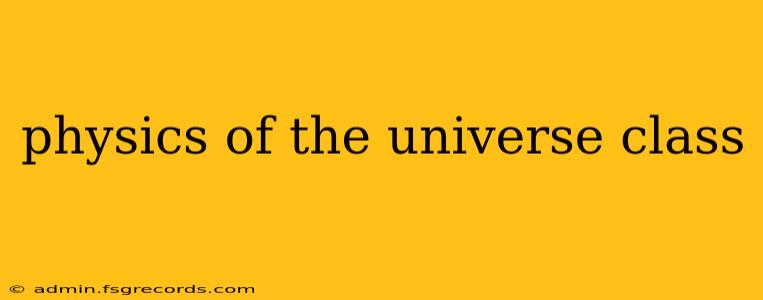The universe. A boundless expanse of mystery, wonder, and breathtaking complexity. For centuries, humanity has gazed at the stars, pondering the fundamental forces and laws that govern this awe-inspiring realm. A "Physics of the Universe" class offers a thrilling journey into the heart of this cosmic puzzle, exploring the fundamental principles that shape our reality. This article delves into what you can expect from such a course, highlighting key topics and the profound impact of understanding the physics behind our universe.
What to Expect in a Physics of the Universe Class
A typical "Physics of the Universe" class provides a comprehensive overview of cosmology and astrophysics, often bridging the gap between introductory physics and advanced research topics. While the specific curriculum varies depending on the institution and instructor, common themes include:
1. Cosmology: The Big Bang and Beyond
This section lays the foundation, exploring the Big Bang theory – the prevailing cosmological model for the universe's origin and evolution. You'll learn about:
- The expansion of the universe: Understanding redshift, Hubble's Law, and the evidence supporting an expanding universe.
- Cosmic Microwave Background (CMB): Analyzing the CMB radiation as a relic of the early universe and its implications for our understanding of the Big Bang.
- Dark matter and dark energy: Exploring the mysterious components that constitute the majority of the universe's mass-energy content and their influence on cosmic evolution.
- Inflationary models: Investigating the theory of rapid expansion in the very early universe and its potential to resolve some cosmological puzzles.
2. Astrophysics: Stars, Galaxies, and Black Holes
This part delves into the physics of celestial objects and their interactions, covering:
- Stellar evolution: Tracing the life cycle of stars from their formation in nebulae to their eventual demise as white dwarfs, neutron stars, or black holes.
- Galactic structure and dynamics: Exploring the formation and evolution of galaxies, including spiral, elliptical, and irregular galaxies, along with the role of gravity and dark matter.
- Black holes: Investigating the properties of black holes, their formation mechanisms, and their profound impact on their surroundings.
- Gravitational waves: Understanding the detection and significance of gravitational waves as a new window into the universe.
3. Fundamental Forces and Particles
The course often incorporates elements of particle physics, exploring:
- The Standard Model of particle physics: Learning about the fundamental forces (gravity, electromagnetism, strong and weak nuclear forces) and the elementary particles that constitute matter.
- Quantum field theory: Gaining an introduction to the theoretical framework describing the interactions of particles and fields.
- The search for new physics: Exploring ongoing efforts to extend the Standard Model and address outstanding questions, such as the nature of dark matter and dark energy.
Beyond the Textbook: The Practical Applications
The knowledge gained in a "Physics of the Universe" class isn't confined to theoretical concepts. It has profound implications for various fields, including:
- Technology: Advancements in astrophysics and cosmology often lead to technological breakthroughs in areas such as imaging, data analysis, and materials science.
- Space exploration: A deep understanding of the universe's physics is crucial for planning and executing successful space missions.
- Fundamental research: The course encourages critical thinking and problem-solving skills applicable to various scientific disciplines.
Conclusion: Embark on a Cosmic Journey
A "Physics of the Universe" class is more than just a course; it's an immersive journey into the vast and enigmatic cosmos. It offers a unique blend of theoretical knowledge and practical applications, providing students with a deeper appreciation of our place in the universe and the fundamental laws that govern its existence. If you're captivated by the mysteries of the cosmos, this course is a gateway to unraveling its secrets.

